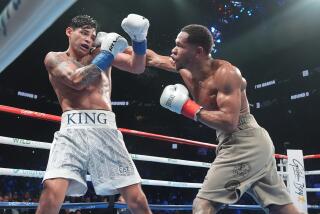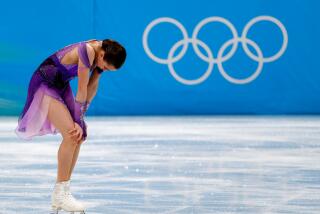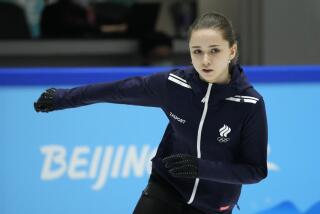Lund Is Barred From Games
- Share via
TURIN, Italy — Only hours before the opening ceremony, Zach Lund, the top U.S. skeleton racer, was ruled out of the 2006 Olympic Games on Friday because he had used an anti-baldness product with a substance that can be used to mask steroid use.
The Swiss-based Court of Arbitration for Sport (CAS) issued a one-year ban.
Lund, 26, of Salt Lake City, tested positive at a World Cup race in Calgary in November. He has consistently denied any doping intent, saying he was simply trying to keep the hair he had by using finasteride, found in Propecia. He had been considered a medal contender in the headfirst sledding event.
The CAS said his lack of intent was no excuse, a position echoed by Dick Pound, head of the Montreal-based World Anti-Doping Agency. Pound said, “There have to be other treatments for hair loss, for hair replacement, than stuff that is a masking agent -- that are on the prohibited list. I think he was lucky to get one year, frankly.”
Lund said in a conference call that he was “very sad” at the outcome, adding, “The anti-doping system has really let me down as an athlete.”
He also said, “They stuck to the rules, which need to be reviewed and looked at, which are very black and white. There’s no room for gray.”
The decision echoes a ban upheld in August 2004, during the Athens Olympics, that left U.S. sprinter Torri Edwards out of those Games before she could run. She had taken glucose tablets laced with the stimulant nikethamide at a meet that April in Martinique.
Edwards said then that she didn’t know the tablets contained the stimulant.
Lund maintains that he had been taking finasteride for more than six years, under a doctor’s care, had declared it on his doping-control forms and didn’t know it had been put on the banned list in 2005.
Not good enough, the three-member CAS panel said.
Athletes are responsible for knowing what’s in their systems, the tribunal said.
Lund’s attorney, Howard Jacobs of Los Angeles, said the ruling suggested “the doping rules lack any notion of common sense,” calling it “one of the most tragic cases I’ve been involved in.”
According to U.S. Olympic Committee spokesman Darryl Seibel, Lund has “voluntarily” returned his Olympic accreditation. The decision Friday also marks the latest turn in a tumultuous month for the U.S. Bobsled and Skeleton Federation. U.S. Coach Tim Nardiello was suspended amid allegations of sexual harassment, then reinstated and, ultimately, fired after ignoring federation orders to stay away from the U.S. team during training in Switzerland.
In Lund’s case, the U.S. federation did not immediately report his positive test to the U.S. Anti-Doping Agency, as is required. Because of the delay, USADA could not rule on Lund’s case until January.
Lund was the overall World Cup leader in skeleton after the first four events but has not competed since mid-December.
The sport involves sliding headfirst on a sled down the icy run used for bobsled and luge at about 70 mph.
Another U.S. racer, Chris Soule, who competed in the 2002 Salt Lake City Olympics, will substitute for Lund here, Seibel said.
After Lund had tested positive, USADA publicly warned him -- but did not issue a suspension -- on Jan. 23. WADA appealed, contending USADA had been too lenient, “an unfortunate thing for USADA to have done,” Pound said Friday.
Finasteride was put on the banned list Jan. 1, 2005, after its inclusion had been announced in September 2004.
Last year, tennis player Mariano Hood of Argentina and soccer player Nemanja Vucicevic of Germany were banned for using it.
The CAS noted Friday that Lund had usually checked the banned list but failed to do so in 2005, saying, “It is his failure to continue to monitor the [list] ... that has placed [him] in his present predicament.”
The panel said it found Lund to “be an honest athlete, who was open and frank about his failures,” and had arrived at the decision to suspend “with a heavy heart.” The panel added, however, that Lund could not “escape all liability,” and issued the one-year penalty, cutting the standard two-year ban. Lund’s 2006 Olympic dream is gone, however. Even so, he said he still considered himself an “Olympian.”
“As an Olympian, I will continue to hold my head up high and take the high road,” he added.
More to Read
Go beyond the scoreboard
Get the latest on L.A.'s teams in the daily Sports Report newsletter.
You may occasionally receive promotional content from the Los Angeles Times.






